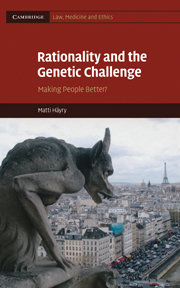Book contents
- Frontmatter
- Contents
- Preface
- 1 Seven ways of making people better
- 2 Rational approaches to the genetic challenge
- 3 The best babies and parental responsibility
- 4 Deaf embryos, morality, and the law
- 5 Saviour siblings and treating people as a means
- 6 Reproductive cloning and designing human beings
- 7 Embryonic stem cells, vulnerability, and sanctity
- 8 Gene therapies, hopes, and fears
- 9 Considerable life extension and the meaning of life
- 10 Taking the genetic challenge rationally
- Bibliography
- Index
3 The best babies and parental responsibility
Published online by Cambridge University Press: 05 July 2014
- Frontmatter
- Contents
- Preface
- 1 Seven ways of making people better
- 2 Rational approaches to the genetic challenge
- 3 The best babies and parental responsibility
- 4 Deaf embryos, morality, and the law
- 5 Saviour siblings and treating people as a means
- 6 Reproductive cloning and designing human beings
- 7 Embryonic stem cells, vulnerability, and sanctity
- 8 Gene therapies, hopes, and fears
- 9 Considerable life extension and the meaning of life
- 10 Taking the genetic challenge rationally
- Bibliography
- Index
Summary
In this chapter, I examine three views on parental responsibility in reproductive selection. The first says that all selection is wrong; the second allows some selection at the discretion of the parents; and the third makes choices in the light of genetic and medical information a moral duty.
From infanticide to embryo selection and beyond
Most people want to have children and most societies support them in this endeavour. But many people have specific views about the kind of children they want to have and many societies support, officially or unofficially, their views. Newborn infants with disabilities have historically been excluded from the category of desired offspring. Health and normal physical and mental development have often been seen as reasonable parental expectations; and hopes of beauty, strength, and intelligence have not always been frowned on, either. A variety of methods have been suggested to achieve the coveted results, ranging from killing babies of the wrong type or letting them die, through terminations of pregnancy and the selection of embryos before implantation, to choosing reproductive partners and changing the qualities of unborn human beings by therapies or enhancements.
Philosophers of all schools of normative ethics have from time to time condoned infanticide, the disposal of unwanted babies, for one reason or another. Plato and Aristotle held up the idea of getting rid of defective newborns for eugenic purposes. Immanuel Kant maintained that a child born out of wedlock presents such a threat to the mother’s honour as a woman that she has a moral duty to terminate its existence. Jeremy Bentham argued that humanitarian concern for women should force lawgivers to assume a lenient attitude towards infanticide. These views reflect, to a degree, the social realities and perceptions of their times.
- Type
- Chapter
- Information
- Rationality and the Genetic ChallengeMaking People Better?, pp. 52 - 77Publisher: Cambridge University PressPrint publication year: 2010



